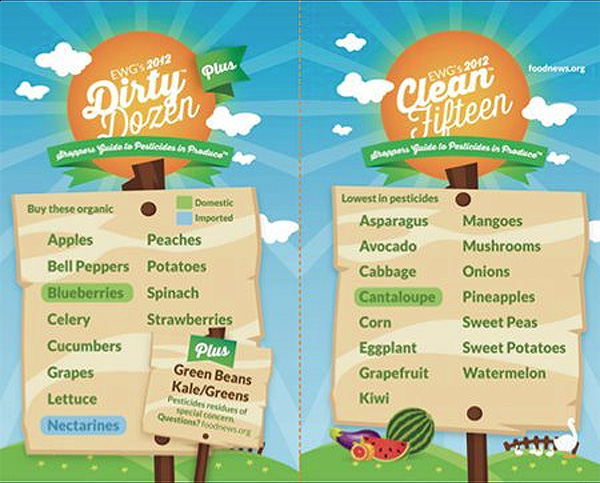TIP OF THE DAY: The Dirty Dozen & The Clean Fifteen
|
The bounty of summer produce encourages us to eat more fruits and vegetables. It seems like the healthy thing to do, and it is. But it’s also time to consider the issue of pesticide residues, and when you should buy organic versus conventional produce. Rinsing the produce does not remove all of the chemical residue. The Environmental Working Group (EWG) creates an annual Shopper’s Guide to Pesticides to reduce your exposure to chemical pesticides. For fruits and vegetables that have the most pesticide residues—the list below on the left side, known as the “Dirty Dozen”—it is the most important to buy organic versions. But the organization also underscores that: |
 Affordable in the summer months, we love eating blueberries as often as we can. They’re so high in antioxidants—but also high in pesticide residue. Photo courtesy Siggi’s. |
|
|
As far as the most chemical-free produce, look to the list on the right: the “Clean Fifteen.” Why is some produce “dirty” and others “clean?” Crops differ in their hardiness—whether they’re more or less susceptible to intense heat, cold, rainfall, drought, fungus or other disease, etc. In the case of bugs, some crops are more readily attacked and destroyed by the hungry little critters. So chemical pesticides are used to kill the bugs, fungus, etc. before they kill the crop. Though the Environmental Protection Agency has been restricting the uses of the most toxic pesticides, they are still detected on some foods. For example, green beans were on last year’s Dirty Dozen Plus list because they were often contaminated with two highly toxic organophosphates. Those pesticides are being withdrawn from agriculture. But leafy greens still show residues of organophosphates and other risky pesticides. That’s why they are on the Dirty Dozen Plus list for 2013. Learn more at EWG.org.
|
||
